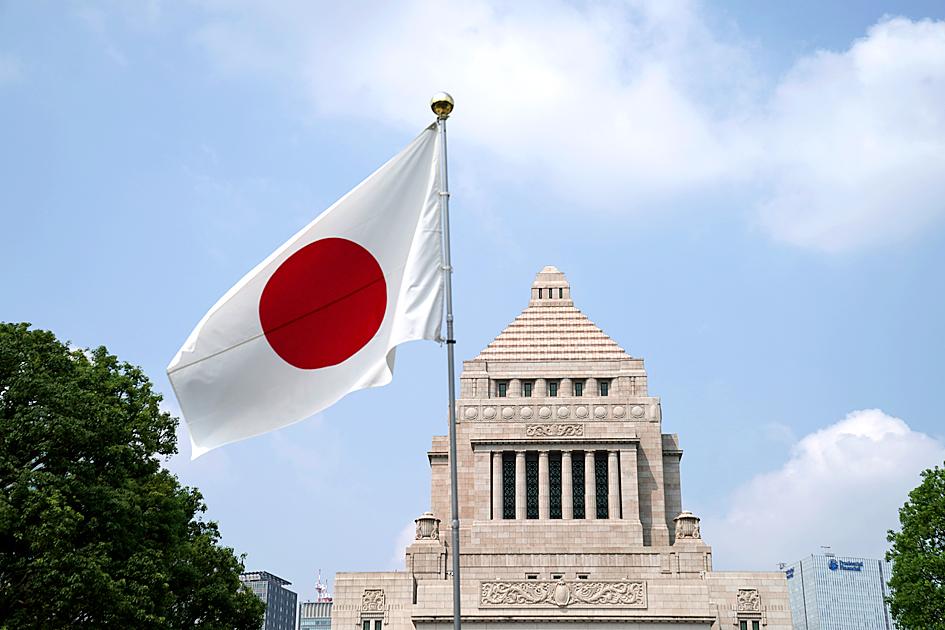Three major political parties in Japan have included Taiwan among issues in their campaign platforms ahead of next month’s upper house elections.
The ruling Liberal Democratic Party (LDP), the Constitutional Democratic Party of Japan (CDP) and the Japan Innovation Party (JIP) are among those vying for 125 seats in the House of Councilors in the July 10 vote.
The upper house of the Japanese Diet has 284 seats, about half of which are up for re-election every three years.

Photo: EPA-EFE
The CDP, the nation’s largest opposition party, has proposed to establish an international institution for security cooperation within the ASEAN Plus Three network to ensure that there is not “a Taiwan emergency,” it said.
ASEAN Plus Three refers to the 10 ASEAN member states plus China, Japan and South Korea.
The CDP also advocates for enhancing the quality of Japan’s national defense abilities.
The JIP proposes in its campaign platform to “establish a Japanese version of the [US’s] Taiwan Relations Act” to boost ties with Taiwan, and would negotiate a free-trade agreement.
The LDP also promises to strengthen Japan’s defenses, saying that many NATO members spend 2 percent of their GDP on national defense, a target also supported by the JIP.
The LDP last year said in its campaign for the House of Representatives — or lower house — that it would bolster cooperation with Taiwan, the US, Australia, India, Europe, ASEAN and Pacific island nations to realize a “free and open Indo-Pacific region.”
The party maintains the same stance in its campaign platforms for the upcoming upper house election.
As this is the first national election since Japanese Prime Minister Fumio Kishida assumed office last year, political observers have said that the results of the upper house elections would be viewed as an assessment of his administration.
The LDP and its coalition partner, Komeito, hold 138 seats in the upper house, 69 of which are not up for election this year.
Kishida’s LDP is trying to maintain a majority of the upper house seats, which would require winning 56 seats, with Komeito contributing to the total.

US climber Alex Honnold is to attempt to scale Taipei 101 without a rope and harness in a live Netflix special on Jan. 24, the streaming platform announced on Wednesday. Accounting for the time difference, the two-hour broadcast of Honnold’s climb, called Skyscraper Live, is to air on Jan. 23 in the US, Netflix said in a statement. Honnold, 40, was the first person ever to free solo climb the 900m El Capitan rock formation in Yosemite National Park — a feat that was recorded and later made into the 2018 documentary film Free Solo. Netflix previewed Skyscraper Live in October, after videos

Starting on Jan. 1, YouBike riders must have insurance to use the service, and a six-month trial of NT$5 coupons under certain conditions would be implemented to balance bike shortages, a joint statement from transportation departments across Taipei, New Taipei City and Taoyuan announced yesterday. The rental bike system operator said that coupons would be offered to riders to rent bikes from full stations, for riders who take out an electric-assisted bike from a full station, and for riders who return a bike to an empty station. All riders with YouBike accounts are automatically eligible for the program, and each membership account

A classified Pentagon-produced, multiyear assessment — the Overmatch brief — highlighted unreported Chinese capabilities to destroy US military assets and identified US supply chain choke points, painting a disturbing picture of waning US military might, a New York Times editorial published on Monday said. US Secretary of Defense Pete Hegseth’s comments in November last year that “we lose every time” in Pentagon-conducted war games pitting the US against China further highlighted the uncertainty about the US’ capability to intervene in the event of a Chinese invasion of Taiwan. “It shows the Pentagon’s overreliance on expensive, vulnerable weapons as adversaries field cheap, technologically

NUMBERs IMBALANCE: More than 4 million Taiwanese have visited China this year, while only about half a million Chinese have visited here Beijing has yet to respond to Taiwan’s requests for negotiation over matters related to the recovery of cross-strait tourism, the Tourism Administration said yesterday. Taiwan’s tourism authority issued the statement after Chinese-language daily the China Times reported yesterday that the government’s policy of banning group tours to China does not stop Taiwanese from visiting the country. As of October, more than 4.2 million had traveled to China this year, exceeding last year. Beijing estimated the number of Taiwanese tourists in China could reach 4.5 million this year. By contrast, only 500,000 Chinese tourists are expected in Taiwan, the report said. The report